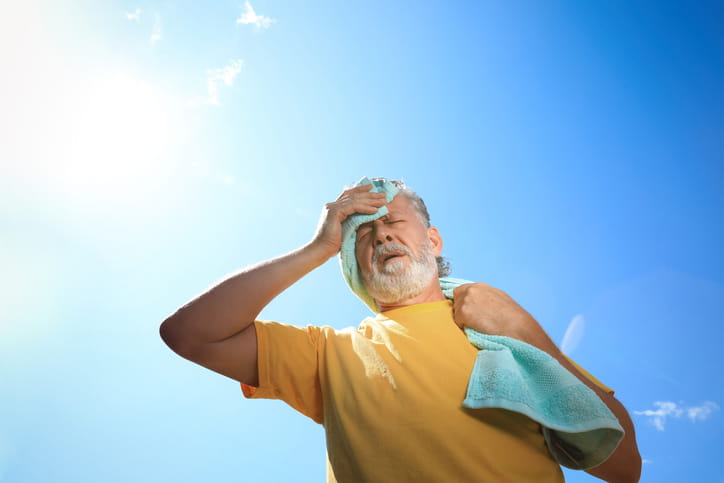Tips For Utah Seniors To Manage Chronic Conditions During The Summer Heat

Summertime in Utah means sunshine, scenic views, and plenty of opportunity to enjoy the outdoors. However, it also brings heat. For seniors, especially those managing chronic conditions, the intense heat can pose a serious health risk.
High temperatures and dry weather can worsen symptoms of chronic illness, increase the risk of dehydration, and even lead to heat-related emergencies or death.
Whether you’re living independently or with support, it’s crucial to take proactive steps to stay safe and healthy. Today we offer you a comprehensive guide with practical tips for Utah seniors to manage chronic conditions, prevent heat related illnesses, and enjoy a safer summer.
Why Are Seniors More Vulnerable In The Heat?
As we age, our bodies become less efficient at regulating temperature. Seniors often have a reduced sense of thirst, slower perspiration response, and may be on medications that impair their ability to stay hydrated or cool down.
Combined with chronic health conditions, the risk of heat-related complications increases significantly.
See the locations we serve in Utah.
General Tips For Seniors To Stay Healthy In The Heat
Even without chronic conditions, all seniors must be vigilant when the weather is extremely hot. A few common sense precautions can go a long way in keeping everyone over 65 happy and healthy.
This includes:
Hydration
Perhaps the most important factor in beating the summer heat and staying healthy is to stay hydrated. Seniors are particularly at risk of dehydration, and should drink small amounts of water throughout the day.
Seniors should avoid caffeine and alcohol, which can dehydrate you. Water should be the primary hydration method, but in extreme heat, electrolyte drinks may be a good idea. Water-rich foods like watermelon, cucumbers and oranges can help as well.
Also consider carrying around a reusable water bottle.
Dress For The Weather
Seniors should wear light colored clothing that is loose fitting. Breathable fabrics like cotton are also a good idea, and if seniors are out in the sun, sunscreen is a must. However, seniors should aim to avoid vigorous activity during the hottest part of the day, from about 11 a.m. to 3 p.m., or even later.
Heatstroke is a common concern among the elderly, and should be watched out for. Confusion, fainting, and a high body temperature (above 103 degrees fahrenheit) are symptoms.
Air Conditioning
In hotter climates like Utah, air conditioning is almost a necessity, especially for seniors. If you don’t have central air in the house, a window unit can — literally — be a life saver. Window units can be purchased inexpensively, and the cost of running them can potentially be offset with government programs for seniors.
The National Council on Aging has some good resources for seniors and their loved ones about help with purchasing and running air conditioners.
Types Of Chronic Conditions Impacted By Heat And How To Manage Them
Knowing you or your loved one’s specific condition is impacted by the heat is the first step to proper management.
Conditions can include:
Diabetes
Extreme heat can affect blood sugar levels and reduce the effectiveness of insulin and oral medications.
In the heat, blood sugar may need to be monitored more frequently, insulin must be stored properly and meals should not be skipped, even in the heat.
COPD
Hot air and air pollution (often worse during summer due to wildfires or ozone levels) can trigger respiratory distress.
Before heading outside, check the air quality index and stay inside on bad days. Consider an air filter that filters smoke as well.
Asthma
In a similar way to COPD, hot air and summer wildfires can invoke asthma responses in those who are prone.
Precautions are similar to COPD above, and elders may want to consider a humidifier if the air is dry, like it often is in Utah.
Kidney Disease
Dehydration is common among seniors when the weather is hot. It can worsen kidney function and place strain on the kidneys.
Remember to drink lots of water and stay hydrated.
Heart Disease
Heat puts additional stress on the cardiovascular system, increasing the risk of heart attacks and strokes.
Avoid heavy physical activity in the heat, and monitor swelling that can come with fluid retention and can cause the heart to work harder.
For Skilled Nursing And Rehabilitation In Utah, Call Monument Health Group
Managing chronic health conditions during Utah’s dry and often intense summer heat can be challenging, but with the right strategies, seniors can stay safe and active.
Call us today for the best skilled nursing care and rehabilitation in Utah. We’re looking forward to answering any of your questions.
